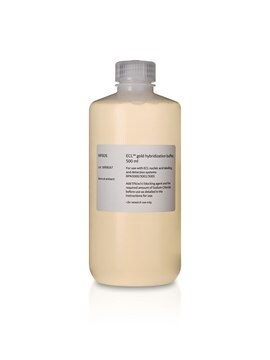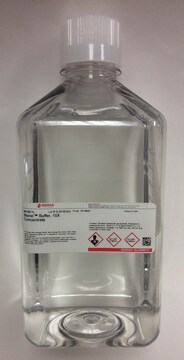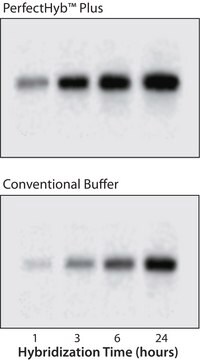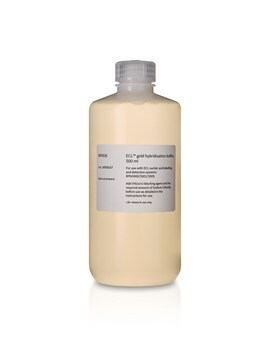GERPN3005
ECL™ Direct Nucleic Acid
Cytiva RPN3005, pack of 1 ea
Se connecterpour consulter vos tarifs contractuels et ceux de votre entreprise/organisme
About This Item
Code UNSPSC :
41105300
Nomenclature NACRES :
NA.31
Produits recommandés
Conditionnement
pack of 1 ea
Fabricant/nom de marque
Cytiva RPN3005
Température de stockage
2-8°C
Catégories apparentées
Description générale
ECL™ Direct Labeling Module.
Application
ECL™ Direct Nucleic Acid Labeling and Detection Systems are based on the direct labeling of DNA or RNA probes with horseradish peroxidase (HRP) in a simple 20 min chemical reaction. The resulting probe can be used without purification. Detection is achieved by generation of light via the HRP-catalyzed breakdown of luminol.
Each system includes the following reagents, sufficient for labeling 5 to 10 μg nucleic acid and detecting 2000 to 4000 cm2 of membrane (depending on product ordered): labeling reagent, crosslinker, control DNA, blocking agent, ECL™ Detection Reagents, and ECL™ Gold Hybridization Buffer.
Each system includes the following reagents, sufficient for labeling 5 to 10 μg nucleic acid and detecting 2000 to 4000 cm2 of membrane (depending on product ordered): labeling reagent, crosslinker, control DNA, blocking agent, ECL™ Detection Reagents, and ECL™ Gold Hybridization Buffer.
Stockage et stabilité
Please be aware this product may be shipped 90 days before the expiration date. For more information on the batch specific expiration date, please contact technical service.
Remarque sur l'analyse
To view the Certificate of Analysis for this product, please visit www.cytiva.com.
Informations légales
ECL is a trademark of Cytiva
Produit(s) apparenté(s)
Réf. du produit
Description
Tarif
Mention d'avertissement
Danger
Mentions de danger
Conseils de prudence
Code de la classe de stockage
12 - Non Combustible Liquids
Certificats d'analyse (COA)
Recherchez un Certificats d'analyse (COA) en saisissant le numéro de lot du produit. Les numéros de lot figurent sur l'étiquette du produit après les mots "Lot" ou "Batch".
Déjà en possession de ce produit ?
Retrouvez la documentation relative aux produits que vous avez récemment achetés dans la Bibliothèque de documents.
C Couturier et al.
Arteriosclerosis, thrombosis, and vascular biology, 20(12), 2559-2565 (2000-12-16)
Type II secreted phospholipase A(2) (sPLA(2)) releases precursors of important inflammatory lipid mediators from phospholipids. Some observations have indicated that the sPLA(2), which has been implicated in chronic inflammatory conditions such as arthritis, contributes to atherosclerosis in the arterial wall.
G Y Akita et al.
Journal of veterinary diagnostic investigation : official publication of the American Association of Veterinary Laboratory Diagnosticians, Inc, 5(2), 154-158 (1993-04-01)
A previously described bluetongue virus (BTV) serogroup polymerase chain reaction (PCR) assay was applied to clinical samples. The sensitivity of the BTV serogroup PCR was increased by the use of non-radioactive chemiluminescent hybridization. Unfractionated whole blood samples from rams experimentally
C Couturier et al.
The Journal of biological chemistry, 274(33), 23085-23093 (1999-08-07)
Type II-secreted phospholipase A(2) (type II-sPLA(2)) is expressed in smooth muscle cells during atherosclerosis or in response to interleukin-1beta. The present study shows that the induction of type II-sPLA(2) gene by interleukin-1beta requires activation of the NFkappaB pathway and cytosolic
H M Peng et al.
Molecular pharmacology, 54(4), 740-747 (1998-10-10)
The regulation of cytochrome P450 (CYP) 2E1, the ethanol-inducible isoform, is particularly complex. The level is affected by a variety of other foreign compounds, by insulin (as studied in several laboratories), and by triiodothyronine (T3), which has not been previously
K Aogi et al.
Clinical cancer research : an official journal of the American Association for Cancer Research, 5(10), 2790-2797 (1999-10-28)
The analysis of the tissue expression patterns of both the telomerase enzyme and the adhesion molecule CD44 has highlighted these molecules as potential tumor markers. In this study, the expression of these markers was analyzed in frozen tissue samples of
Notre équipe de scientifiques dispose d'une expérience dans tous les secteurs de la recherche, notamment en sciences de la vie, science des matériaux, synthèse chimique, chromatographie, analyse et dans de nombreux autres domaines..
Contacter notre Service technique








